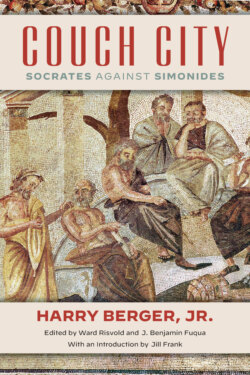Читать книгу Couch City - Harry Berger - Страница 10
На сайте Литреса книга снята с продажи.
II
ОглавлениеCouch City generates its new reading of the Protagoras by shining an especially brilliant light on one particular scene of debate between Socrates and Protagoras, namely their competition over the meaning of a poem about virtue (338e–348c). A centerpiece of Berger’s interpretation, this poetic interlude is not always analyzed by commentators, and when it is, they tend to mention in passing but then ignore that the poem, which both Protagoras and Socrates attribute to Simonides, is not attested to outside the Protagoras. This feature is important to Berger, however, for, if the poem exists only in the Protagoras, then how can we be sure that Simonides rather than, say, Plato, is its author?
Taking seriously the undecidability of the poem’s authorship, Berger refers to its appearances in the dialogue as “poetic speech” to reflect that it is sourced to the speeches of Protagoras and Socrates (338a–347a). Berger pays critical attention to the interpretative practices Protagoras and Socrates deploy as they compete by way of their poetic speeches over the meaning of the poem, for which he invents a playful vocabulary, which includes “snippetotomy,” that is, their interrupted, broken, and selective citation and, in Socrates’s case, “etymological synapses,” proof by “etceteration” (his practice of induction, epagōgē), and, especially, citational and paraphrastic mimicry.
Intent on overthrowing Simonides by showing him to be inconsistent in his understanding of virtue, Protagoras’s poetic speech is an(other) occasion for the sophist to “reduce talk about virtue to a weapon in a political contest.” Although Socrates tees up to defend Simonides against Protagoras’s charge, Berger demonstrates that Socrates, too, “is intent on overthrowing poor Simonides by making him speak against himself, not logically or rhetorically, but ethically.” Through deceleration—a slowing down that makes visible small changes that substantially affect meaning, and are, in Socrates’s description in the Phaedrus, most apt to deceive (261e–262b)—Berger shows that considerable shifts in the meaning of key virtue terms take place over the course of Socrates’s poetic speech, including of “good” (from agathos to esthlos to eumēchanos) and “bad” (from kakos to aischros to amēchanos). This shiftiness, part of Socrates’s “mimicry of sophistical procedure,” changes what it means to be and/or become good and to do and/or suffer bad. It also, Berger shows, produces Simonidean virtue as Protagorean virtue, that is, as avoiding being overthrown through “the skill and good luck necessary to weather misfortune and successfully avoid injury and shameful behavior.”
In making the meaning they claim to be merely interpreting, Protagoras and Socrates, Berger writes, become Simonides’s doubles. In the case of Protagoras, this is anticipated early in the dialogue when Protagoras claims poets as the disguised predecessors of sophists (316d) and narrates the great myth in their manner. Socrates, for his part, appears to dismiss the value of poetry and its interpretation for ethics and philosophy: Because poetic interpretation is indeterminate, he says, he and Protagoras should leave the poets to one side and refrain from imitating poets in their speeches (347a–348a). Socrates says this directly after the poetic interlude, so it could be that he is simply sharing the lesson he has just learned from his inconclusive competition with Protagoras over the meaning of Simonides’s poem. But Socrates doesn’t just say that the poets should be left to one side and leave it at that. He also insists that they should not be imitated and, in so saying, reminds his audience that imitating Simonides was exactly what he did in his poetic speeches, both in his initial citation of the poem against Protagoras’s attack and also when he played Simonides in the debate he staged between the poet and Pittacus. Why call attention to that?
In imitating Simonides through impersonation and representation, Socrates does what he did (and will do again) with Protagoras: As Berger puts it, he “speaks through [the poet and sophist] and represents their motives, their anti-Socratic logoi. In return, they speak through his imitation and make him speak against himself.” Functioning “as a field of displacement for the continuation of the struggle in which Socrates gets the better of the sophist and thereby defeats himself,” Socrates’s poetic speeches bind him to Protagoras and also to Simonides. And, as with Protagoras, so too with Simonides: By defacing Simonides, Socrates effaces himself. Socrates’s poetic speeches make visible a further feature of Protagorean virtue that Berger takes to supervene upon its weaponization in the service of power, namely, its evasion of responsibility. By claiming to be merely interpreting Simonides, and by, moreover, making the sophist Prodicus responsible for his interpretation (340a–342a), Socrates disavows his complicity in the reproduction of Protagorean ethics.
